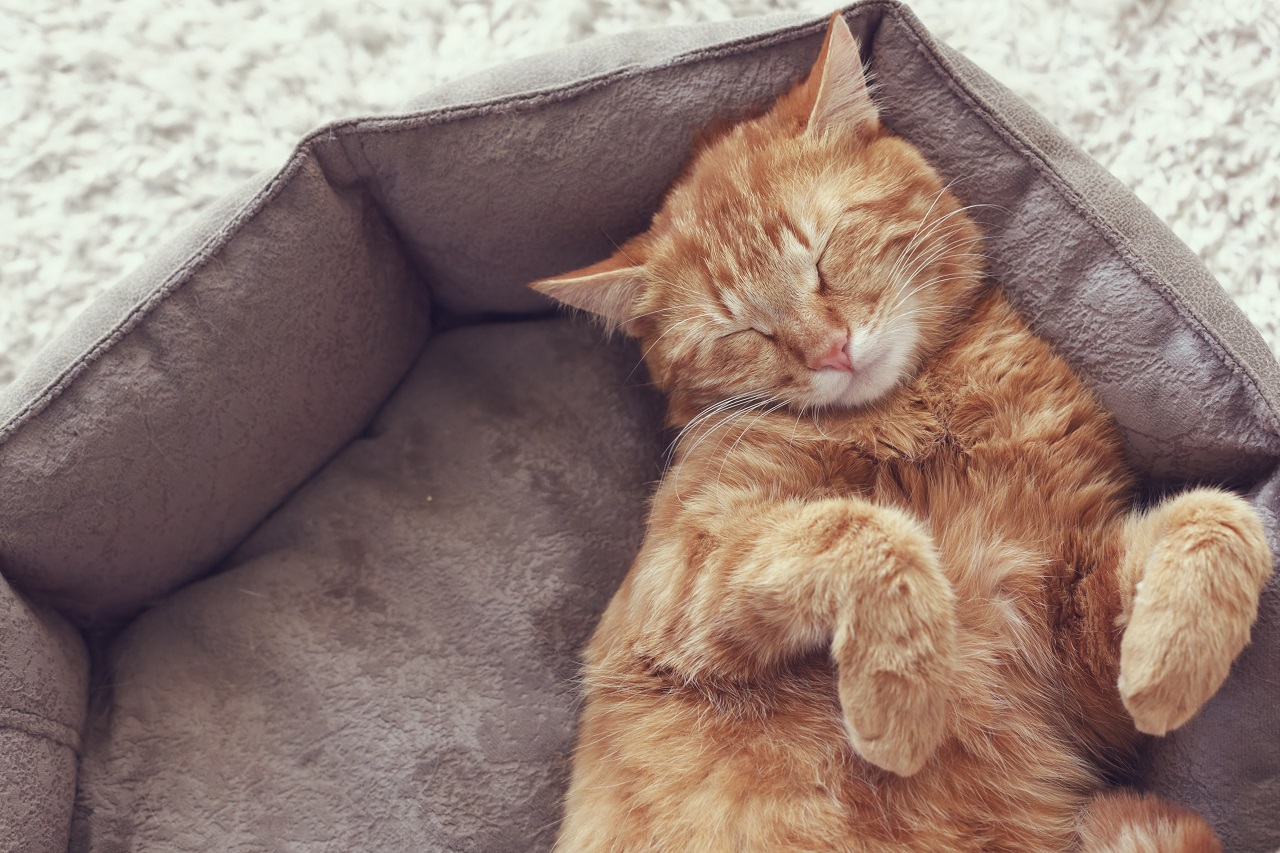Cats have a well-earned reputation for needing their beauty rest. The average feline gets in 15 hours of sleep a day. However, kittens and elderly cats put in as much as 20 hours a day.
When you think about the 8 hours humans need, that’s almost double the snoozing! To compare with other animals, cats sleep less than dogs (12-14 hours), about as long as sloths, and less than bats and possums (20 hours).
The following will delve into feline slumber needs, and whether co-sleeping with your cat is a good idea.
Why do cats sleep so much?
Does it ever seem like every time you turn around, kitty is settling in for yet another cat nap? When you do the math — 15 out of 24 hours in a day — a cat sleeps nearly two-thirds of his life. And then, when you’re talking about a creature that’s mainly active at night (more on that later), they have no choice but to work in as many cat naps as they can. If your cat is sleeping, leave him alone. He really needs that rest.
All animals sleep. While scientists don’t fully understand the why behind sleep, the fact that all animals need it reveals just how necessary it is for good health and longevity. When it comes to cats, researchers believe a cat’s sleep habits may have something to do with their meaty, protein-rich diet: The extra rest aids in digestion, according to VetStreet.com.
How do cats sleep?
One thing you may have noticed is cats sleep in many brief periods. Like us, they experience deep sleep cycles; however, they last all of five minutes. Those adorable paw twitches may reveal REM sleep.
Unlike most humans, cats can spring back to action pretty quickly in response to the right stimuli. The sound of the can opener, or their favorite human walking in the room, is enough to get kitty awake and on her feet. At the same time, it’s important not to disturb your cat when she needs rest, so make sure everyone in the family, kids included, are giving her time and space. When she’s ready to play again, she’ll let you know.
Of course, cats love sleeping curled in dark, enclosed places. This possibly ties into their instinct to protect themselves against predators and ambushes. Because there’s safety in numbers, many are eager to curl up on the laps of their favorite humans, and next to other pets in the house.
If you notice kitty is starting to have troubles with getting up (or laying down), or isn’t waking as readily to the usual cues, these can be signs of underlying medical issues. Schedule a visit with your cat’s vet or primary health professional.
Are cats nocturnal or crepuscular?
The other big question around feline slumber has to do with when they get the most sleep. Some consider cats as nocturnal, which means the majority of their active time is after dark, even though they’re not necessarily sacked out for the entire day (or awake the entire night, for that matter). Others characterize cats as crepuscular, which means their activity peaks at dawn or dusk. The theory is in the wild, a cat’s natural prey is also active around twilight, while bigger nocturnal predators are still at rest.
Whatever the case for your cat, it’s clear their eyes are designed for low-light activity. A cat’s eyes have 6-8 more rod cells than humans’, which makes objects and movements more visible to cats in dim lighting, according to Live Science. By contrast, a human retina has more cones — light receptors that work best in bright light — than a cat.
[Want to learn more about feline eyes? Raising Your Paws podcast explains what that distinctive vertical slit in your cat’s eye is about.]
Should you let your cat sleep in your bed?
When it’s bedtime for you, your cat may also be ready to curl up at your side or lie on top of you for a snooze. People see many advantages to letting their cat sleep in bed with them: After a long busy day, cat snuggles are comforting; the warmth and security is pleasing to the cat; and the closeness deepens the human-feline bond. As long as allergies aren’t a problem for you (or your partner) and your cat isn’t having issues with fleas and ticks, co-sleeping should be perfectly fine.
Since humans need eight hours of shut-eye (and most of us are living with a sleep shortage), the biggest risk of this sleeping arrangement is a higher potential for disrupted sleep. Cats are more disposed to p.m. activities, sleeping in shorter sprints, rather than packing the hours in one continuous block. So, yes, you can pretty much count on her to wake and become active while you snooze. Sometimes, that means kitty will try to get your attention, with meowing, pawing and nudging.
If nighttime pestering is a problem, try some of the training tips in this article, “What to do when kitty meows all the time.”
How to keep your cat out of baby’s crib
As many parents of felines and humans discover, cats find enclosed spaces like bassinets and cribs great for napping and just hanging out (especially if they’re placed in a quiet, darkened room, away from the action). It can also be confusing if baby’s room is a place where your cat was once welcome to spend time napping and playing.
Cats should be kept away from the crib for a couple of reasons.
The number one reason is that cats love warmth, so they may want to lie on the infant, which can block baby’s breathing.
The other has to do with any stress your cat experiences with big changes at home, like bringing home a new baby. A common feline response to stress is going to the bathroom in places they shouldn’t, and that can mean the mattress of the crib or bassinet. (Just don’t interpret this behavior as the cat showing hostility toward you or the infant.)
Ideally, you can set up the crib before baby comes home, and work on training your cat to stay out of the crib:
- Place sheets of aluminum foil on the mattress. The noise startles some cats when they jump.
- Apply strips of double stick tape to the bare mattress. Cats dislike the sticky sensation on their paws.
- Simply remove kitty from the crib with a firm no. Redirect her to a permitted space.
When baby arrives, keep the nursery door closed, just to be safe.
Healthy lifestyle for your cat
To help your cat maintain a healthy lifestyle, give her the time and space so she can get all the rest she needs, while feeding her a delicious high-protein diet that keeps her gut ecosystem in balance. Good 4 Life® exclusive to NutriSource is packed with prebiotics and probiotics to build good gut health, which aids in better digestion (and fewer litter box odors). Shop local and find NutriSource at your independent pet retailer.


